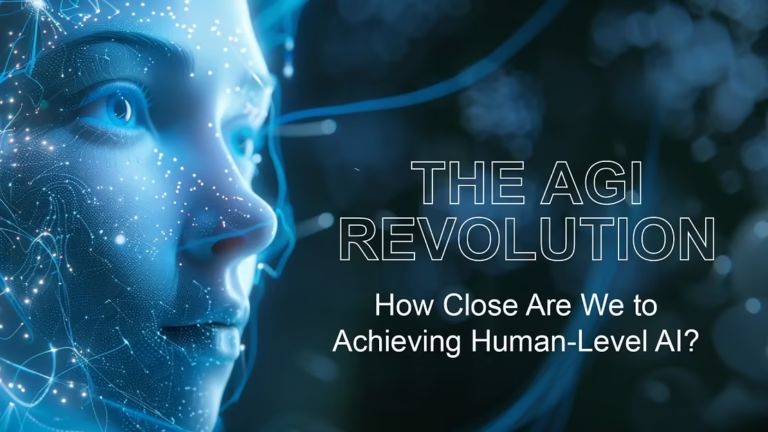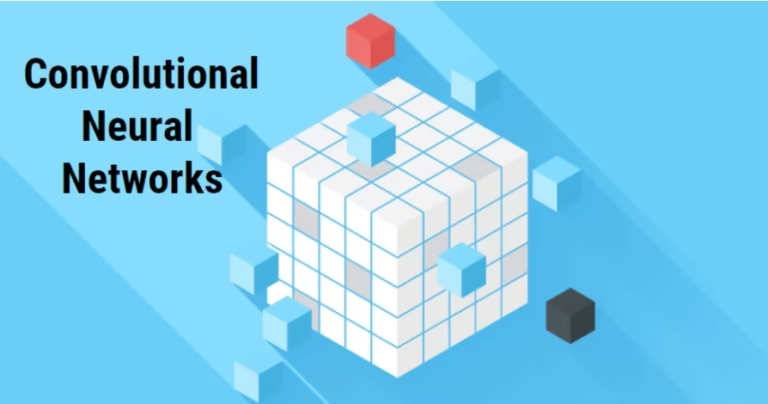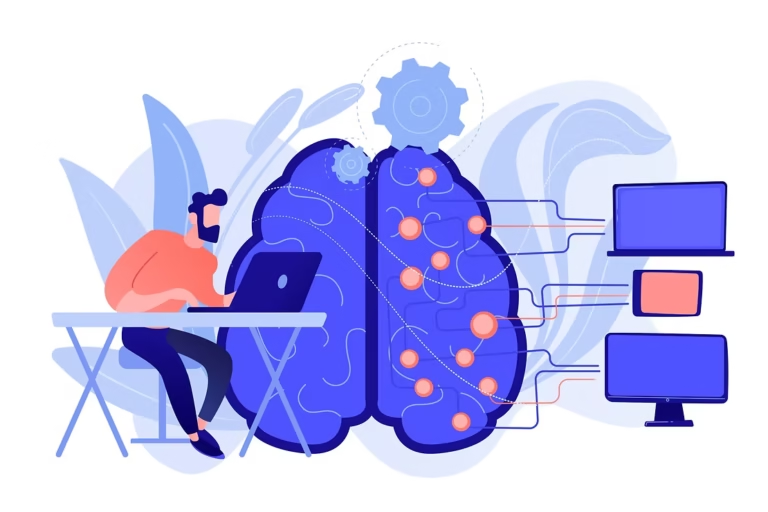Introduction
Artificial intelligence (AI) has transformed our world, making it more automated and efficient. Whether it’s recommendation algorithms on Netflix or autonomous vehicles, these advancements fall under what we call “narrow AI” or AI designed for specific tasks. However, a new frontier in AI is fast approaching: Artificial General Intelligence (AGI). AGI represents a form of intelligence capable of understanding, learning, and applying knowledge across a broad range of tasks, mimicking the versatility of the human brain. These breakthroughs are driving the AGI revolution.
But why does AGI matter? The potential of AGI extends far beyond the current capabilities of AI. It promises to reshape industries, revolutionize how we interact with technology, and raise profound questions about ethics, safety, and human futures. In this blog, we’ll explore what AGI is, why it’s so important, and which companies and founders are leading the charge in AGI research. We’ll also look at how AGI could affect the everyday person and provide you with resources to dig deeper into the subject.
What is Artificial General Intelligence (AGI)?
At its core, AGI refers to an AI system that can perform any intellectual task a human can. Unlike narrow AI, which is designed to solve a specific problem (like a chatbot or a facial recognition system), AGI can generalize its knowledge and apply it to various tasks, much like humans do. This would mean that an AGI system could learn to play chess, drive a car, diagnose diseases, and write poetry—all without needing to be explicitly trained for each task individually.
AGI vs Narrow AI
To understand AGI, it's crucial to differentiate it from the narrow AI systems we interact with today. Narrow AI excels in specialized tasks like speech recognition (e.g., Siri or Alexa) or visual perception (e.g., facial recognition). These systems are often based on machine learning models that have been trained on large datasets to perform specific functions.
In contrast, AGI would not be limited by domain-specific training. It would possess the capability to transfer learning across tasks. For instance, an AGI system that learns a new language could use that knowledge to understand cultural nuances or apply language-based reasoning in another field.
To illustrate this difference with an example: AlphaGo, the AI that beat human champions at the complex game of Go, is a highly specialized system. While it can outperform humans at Go, it wouldn't be able to cook a meal or assist in writing a novel without being explicitly trained for those tasks. AGI, on the other hand, could switch effortlessly between these tasks.
Characteristics of AGI
AGI systems are envisioned to have several key characteristics:
Autonomous learning: The ability to learn from minimal human input.
Generalization: The capability to apply knowledge learned in one area to other, unrelated areas.
Contextual understanding: AGI would have the ability to understand context, making decisions based on the broader picture.
Cognitive flexibility: AGI would be flexible, much like human intelligence, adapting to new and unforeseen situations.
Current Status of AGI
While AGI has been a topic of research for decades, we are still far from creating a system with true general intelligence. However, some AI models, like OpenAI’s GPT series and Google DeepMind’s AlphaFold, are pushing the boundaries of machine learning and intelligence. These systems show glimpses of AGI-like capabilities, such as reasoning, problem-solving, and understanding complex patterns, but they are still task-specific in practice.
The development of AGI will require breakthroughs in multiple areas, including computational power, learning algorithms, and understanding of human cognition.
Why is AGI Important?
The development of AGI holds immense potential, and its significance cannot be overstated. AGI has the power to transform industries, amplify human creativity, and solve problems that have long eluded us. Below are some areas where AGI could have a massive impact.
Revolutionizing Industries
AGI could reshape entire industries, from healthcare to finance and everything in between. Here's how:
Healthcare: AGI systems could diagnose diseases, predict health outcomes, and personalize treatments based on individual genetic data. With access to vast medical data and the ability to analyze it in real time, AGI could revolutionize how we approach healthcare, leading to better outcomes and more efficient care.
Autonomous Systems: Imagine fleets of autonomous vehicles that aren’t just programmed to drive but can learn, adapt, and optimize based on new conditions. AGI-driven autonomous systems could revolutionize logistics, public transportation, and even space exploration.
Software Development: AGI could automate software engineering, where it not only writes code but understands complex system requirements, testing, and optimization processes.
Finance: Predictive analytics and real-time data analysis powered by AGI could provide more accurate market predictions, improving decision-making in sectors like investment banking, insurance, and risk management.
Boost to Human Creativity
One of the lesser-talked-about impacts of AGI is its potential to boost human creativity. While AGI would take over mundane or repetitive tasks, humans could focus more on creative endeavors, whether it be in the arts, sciences, or entrepreneurship. For example, AI systems could collaborate with human musicians to generate new genres of music or assist scientists in discovering novel materials for renewable energy.
Solving Complex Problems
AGI is poised to tackle complex global challenges that humans currently struggle with. For instance:
Climate Change: AGI could help model climate scenarios, optimize renewable energy usage, and even create more efficient energy grids.
Resource Allocation: From water management to food distribution, AGI could optimize the allocation of scarce resources on a global scale.
Healthcare: Besides personalized medicine, AGI could also aid in finding cures for diseases by rapidly analyzing genetic data or simulating drug interactions in virtual environments.
Risks and Ethical Concerns
Despite its potential, AGI also poses significant risks. The possibility of AGI displacing millions of jobs is one of the immediate concerns. Unlike narrow AI, which affects specific job sectors, AGI could render many types of human labor obsolete.
There’s also the issue of security and control. If AGI systems were to fall into the wrong hands or were misused, they could cause widespread harm, from manipulating financial markets to influencing political systems.
Finally, there’s the ethical dilemma: How do we ensure AGI systems align with human values? Developing systems that act in humanity’s best interest without being biased or harmful is one of the biggest challenges researchers face today.
Which Companies and Founders Are Leading AGI Development?
Several tech companies and their visionary founders are leading the charge toward AGI. Let’s take a closer look at the key players and the progress they’ve made so far.
OpenAI
OpenAI is at the forefront of AGI research. Known for creating the GPT series of language models, OpenAI aims to ensure that AGI benefits all of humanity. The company’s vision is to build AI systems that are aligned with human values and can address complex global challenges.
Founder(s): Sam Altman, Elon Musk (initial involvement), Greg Brockman.
Key Projects: GPT-4, Codex, DALL·E.
Funding: OpenAI has raised significant funding, including a major partnership with Microsoft, which invested $1 billion in 2019.
OpenAI’s research on language models like GPT-4 has shown how AI systems can generalize across tasks. While GPT-4 is still a narrow AI system, its ability to understand, generate, and manipulate text across multiple domains is a step toward AGI.
DeepMind (Google)
DeepMind, a subsidiary of Alphabet (Google’s parent company), is another leader in AGI research. DeepMind is known for developing AlphaGo, the AI that defeated world champion Go players, and AlphaFold, a breakthrough AI system that solved the protein-folding problem—a puzzle that had stumped scientists for decades.
Founder(s): Demis Hassabis, Shane Legg, Mustafa Suleyman.
Key Projects: AlphaGo, AlphaFold.
Funding and Acquisition: Google acquired DeepMind in 2015, making it one of the best-funded AI research companies.
DeepMind’s work demonstrates that AI can be applied to solve real-world problems that require human-like reasoning and learning capabilities. AlphaFold’s success in biology showcases AI’s potential to make discoveries in fields that extend far beyond traditional AI applications.
Anthropic
Anthropic is a newer entrant in AGI research but one that has gained attention quickly. Founded by former OpenAI researchers, Anthropic focuses on developing AGI in a way that prioritizes safety and ethical considerations. They aim to build AI systems that are not just powerful but aligned with human interests.
Founder(s): Dario Amodei, Daniela Amodei.
Key Focus: AI safety and interpretability.
Funding: Anthropic has raised hundreds of millions in funding, with a focus on building safer and more interpretable AI systems.
Anthropic's approach emphasizes transparency and safety, ensuring that future AGI systems are aligned with human values.
Microsoft’s Role
While not solely an AGI company, Microsoft’s partnership with OpenAI has positioned it as a key player in AGI’s development. Through its Azure cloud platform, Microsoft provides the computational infrastructure needed for large-scale AI experiments. Additionally, Microsoft’s collaboration with OpenAI on projects like Codex demonstrates its interest in AGI’s potential.
Key Data Points: $1 billion investment in OpenAI, Azure cloud support for AI research, strategic partnerships.
Other Companies to Watch
Several other companies are making strides toward AGI:
Vicarious: A company focused on creating general-purpose AI systems for robotics and automation.
Numenta: A research company exploring how to build brain-like AI systems.
While these companies are smaller in scale, they are making critical contributions to the field of AGI.
Challenges in Achieving AGI
Despite the incredible promise of AGI, there are several technical, ethical, and practical challenges to overcome.
Technical Challenges
AGI requires breakthroughs in areas like computational power, algorithms, and understanding of human cognition. For example:
Processing Power: AGI systems will likely need immense computational resources far beyond what is available today.
Data Availability: Unlike narrow AI systems that rely on specialized datasets, AGI will need to learn from a wide variety of unstructured data.
Efficiency: Current machine learning models are highly specialized and inefficient when applied to general tasks. AGI will require models that can learn and adapt with minimal training.
Ethical and Safety Concerns
One of the biggest challenges is ensuring that AGI systems are aligned with human values. The risk of creating an AGI that pursues goals that are misaligned with human interests could be catastrophic.
Scalability
Another challenge is making AGI scalable and practical for use across industries. While AI systems like GPT-4 are impressive, they require massive computational resources. Scaling these systems up to general intelligence will be a significant hurdle.
Potential Bottlenecks
Hardware Limitations: Even with advanced hardware like GPUs and TPUs, current systems lack the computational capacity to support AGI.
Software Optimization: AGI requires more sophisticated algorithms capable of learning from fewer data points and adapting across a range of tasks.
The Road Ahead: Timelines and Predictions
When will we achieve AGI? This is one of the most debated questions in AI research.
Predictions from Industry Leaders
Sam Altman (CEO of OpenAI) has suggested that we may see early forms of AGI within the next decade, but it could take much longer for truly general systems to develop.
Elon Musk has voiced concerns that AGI could be here sooner than we expect, stressing the importance of regulatory oversight and safety.
Demis Hassabis (CEO of DeepMind) remains more cautious, stating that while significant progress is being made, AGI may still be several decades away.
Current Progress and Expected Milestones
In the next 5 to 10 years, we can expect continued advancements in narrow AI systems with general intelligence slowly emerging from these models. Systems that can autonomously learn new tasks without explicit programming will mark the first true milestones toward AGI.
Government and Regulatory Impact
The development of AGI is likely to be influenced by government regulations and policies. Currently, there is growing concern around AI ethics, data privacy, and the potential misuse of AGI. Governments around the world will need to play a role in regulating AGI development to ensure it aligns with public interests.
Public Perception and Involvement
Public interest in AGI has grown substantially, especially with the rise of AI tools like ChatGPT and DALL·E. However, there is also concern. Surveys show that while people are excited about AI’s potential, there are fears about job loss, privacy, and the misuse of AI systems.
How is AGI Going to Affect the Common Person?
The advent of AGI will have profound effects on daily life. Here are some ways AGI might impact the everyday person.
Everyday Life Changes
Job Market: One of the most immediate concerns is job displacement. While AGI could create new industries and roles, it will also make certain jobs obsolete. Sectors like customer service, transportation, and retail are likely to be impacted first.
Personal Assistants: AGI-powered assistants could revolutionize daily tasks. Imagine a personal assistant that can manage your finances, schedule, and even health monitoring without needing constant input.
Healthcare at Home: With AGI, people could have access to advanced diagnostics and personalized treatment plans at home, reducing the need for constant doctor visits.
Entertainment and Media: AGI could transform how we consume content. From personalized movies to interactive storytelling, the entertainment landscape could change dramatically.
Education: AGI-powered personal tutors could tailor lessons to individual learning styles, making education more accessible and effective for everyone.
Social and Economic Impact
Wealth Inequality: One of the major concerns is that AGI could widen the gap between the rich and poor. Wealthier individuals and corporations might gain earlier access to AGI technologies, increasing the inequality divide.
Lifelong Learning: The rise of AGI will likely require workers to constantly upskill. Lifelong learning will become essential for staying competitive in an AGI-dominated job market.
Data Privacy: AGI systems will likely have access to enormous amounts of personal data. Ensuring that this data is used ethically and securely will be a major challenge for governments and corporations.
Top 10 Research Papers and Articles on AGI for Further Reading
Here are 10 essential resources for anyone interested in learning more about AGI:
"Artificial General Intelligence: Concept, State of the Art, and Future Prospects" by Ben Goertzel
"Building Machines that Learn and Think Like People" by Josh Tenenbaum
"Reward is Enough" by Silver et al., DeepMind
"Scaling Laws for Neural Language Models" by OpenAI
"The Bitter Lesson" by Rich Sutton
"Artificial Intelligence – A Modern Approach" by Stuart Russell and Peter Norvig
"Alignment for Advanced Machine Learning Systems" by Nick Bostrom et al.
"The Future of AGI: Challenges, Scenarios, and Paths Forward" by J. Yudkowsky
"Ethics of Artificial Intelligence and Robotics" by Vincent Müller
"Open Problems in AGI Safety" by Hubinger et al.
Conclusion
Artificial General Intelligence (AGI) holds the potential to revolutionize industries, boost human creativity, and solve some of the world's most complex problems. Companies like OpenAI, DeepMind, and Anthropic are at the forefront of AGI research, pushing the boundaries of what machines can do. However, the road to AGI is filled with challenges, from technical bottlenecks to ethical dilemmas.
For the common person, AGI could lead to significant changes in the job market, personal life, and overall well-being. As AGI development continues, it’s crucial to stay informed and engaged with its progress. Whether you’re a software engineer, a business leader, or just a curious individual, understanding AGI will be key to navigating the future.
Now is the time to prepare for the upcoming AGI revolution—one that will reshape not just industries but the very fabric of our daily lives.






